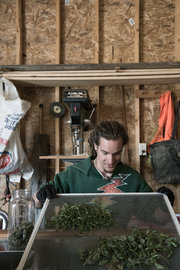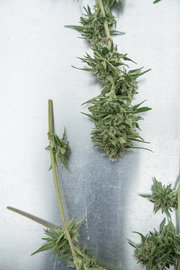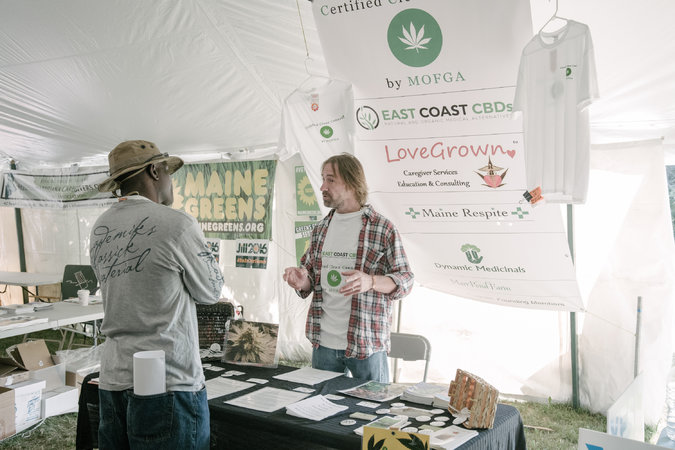Some medical marijuana users may not care if the product they buy is certified as clean; their primary concern is whether it meets their needs. But growers like Ms. Haywood see the distinction as an opportunity in an intensely competitive market.

Maine’s caregiver program is growing quickly, up nearly 150 percent to 2,921 growers in 2015, from 1,197 in 2013. It is also competing with a parallel network of eight marijuana dispensaries in the state. If Maine voters approve a citizens’ initiative in November, marijuana will be legalized, and competition will probably increase exponentially.
Prices are flat already. Ms. Haywood typically sells her marijuana for $10 a gram (0.035 ounce), but other growers are charging less and offering discounts for buying by the ounce. Margins are tight, but the business provides growers with a steady, if small, income, Ms. Haywood said, adding that she earns less than $30,000 a year after costs.
“I feel like anybody who uses anything that is not organic, whether it’s food or smoke, or whatever, they are making a mistake,” said Dawson Julia, 45, another grower. “I feel like it’s a bad health choice.” (The fit-looking Mr. Julia offered this health tip: “I work 14 hours a day, and I smoke a lot of cannabis, so that’s my secret. No gyms allowed.”)
Getting the certification, however, was an arduous process in Maine.
Mr. Julia, who owns East Coast CBDs, which is housed in a warehouse in the small town of Unity, Me., is a longtime marijuana user. He said the state’s medical marijuana program, approved by citizens’ initiative in 2009, allowed him to turn his passion into a livelihood. “When it passed on the ballot, it was like a dream come true,” he said.
Mr. Julia sowed the seeds for the clean certification program in 2013. He was one of the first growers to approach the Maine Organic Farmers and Gardeners Association about it. The industry association has 11,000 members and a staff of 30, and it has been certifying Maine farms as organic since 1972.
“I called thinking I was just going to sign up for the program, you know, ‘I want to grow organic marijuana, where do I get the paperwork?’”
Advertisement
Continue reading the main story
That is when he learned that the word “organic” is defined by the Department of Agriculture’s National Organic Program, which sets the standards for certification. Marijuana, still illegal under federal law, is not a crop the program recognizes (tobacco, however, is).

Mr. Julia was undeterred. If the Maine association had no program for marijuana, he thought it could start one. If growers could not use the organic label, they would use another.
He found an ally in the board member John Krueger, a gardener who grows much of his own food and once ran the Maine Health and Environment Testing Laboratory. Mr. Krueger said he saw parallels between this new generation of marijuana growers and his peers in Maine’s 1970s back-to-the-land movement. They convened a committee, which included Ms. Haywood.
After dozens of meetings over two and half years, the certification plan was started in August as a one-year trial. The plan follows the United States Department of Agriculture standards. Plants must be grown in soil (hydroponics do not qualify) and fertilized with natural nutrients, and pesticides are tightly restricted.
But Mr. Julia does not expect to increase his prices as a result. “Just because I got a certificate that says this is official, clean cannabis, I’m absolutely not going to charge any more,” he said. “If anything, it’s an incentive to help inspire other people to follow our lead.”
Maine is following the lead of Western states, where the industry is more mature. Clean Green Certified has been certifying marijuana in five Western states since 2004, including 20,000 pounds in 2015. And Colorado’s Organic Cannabis Association has developed a pesticide-free certificate.
Amy Andrle, of L’Eagle Services, which grows and sells marijuana in Denver, serves on the association’s board. She said as pot consumers are becoming more sophisticated, “there’s nothing like the value of a third-party certifier” to give growers a marketing edge.
Certification is just one tricky aspect of an industry that Ms. Haywood said was fraught with complexity.

For one thing, she cannot open a business bank account. Banks are closely scrutinized over illegal drug-trafficking, which has posed a vexing problem for legal businesses. Visa and MasterCard will not process transactions for marijuana dispensaries, and most banks will not open accounts for the businesses.
Advertisement
Continue reading the main story
Proposed state regulations pose another hurdle. Ms. Haywood has visited the State House in Augusta dozens of times in the last few years and submitted many pages of testimony to fight increased regulation, which she calls “legislative overreach.”
Mr. Julia and his wife are both classified as caregivers, so their operation can be twice as large as Ms. Haywood’s. Each caregiver can serve as many as five patients and grow up to six flowering plants for each.
Mr. Julia’s warehouse holds 60 flowering plants. Many others are immature, spread out in a rabbit warren of rooms painted white, with bright lights and ventilation ducts hanging from the ceiling. But there is little opportunity to grow further largely because of staffing issues and state limitations. “My business is maxed out,” he said. “We turn away new patients now, because we can’t grow enough to keep up with everybody.”
One restriction is a state regulation that allows each caregiver to hire just one employee, so Mr. Julia and his wife may hire only two others.
“It’s frustrating,” Mr. Julia said. “Because I’ve got employees that are working 60 to 65 hours a week, and I’ve got to pay overtime, and they are getting burnt out. Meanwhile, we’ve got customers that are expecting products and service.”
Security is another challenge. Even though his operation is in the heart of a small town, he has been robbed twice. But he said he also feels the squeeze from law enforcement. When state regulators came to inspect his business recently, Mr. Julia said, they brought a small convoy from the county sheriff’s office, though he was not cited for any infraction.
Ms. Haywood says she often feels in limbo. “I feel the heavy hand of government, and kind of an eye in the sky always watching me,” she said. “And I feel, frankly, like I’m a criminal, yet a business owner at the same time. It’s a dichotomy that I deal with every day.”
Continue reading the main story
Article source: http://www.nytimes.com/2016/09/29/business/smallbusiness/maines-clean-medical-marijuana-organic-in-disguise.html?partner=rss&emc=rss
Speak Your Mind
You must be logged in to post a comment.